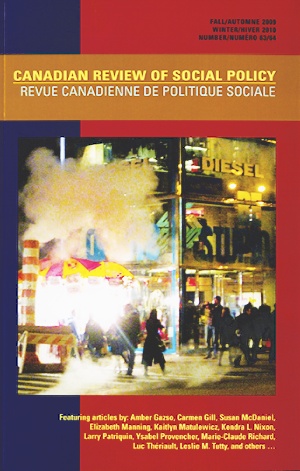The 'Great West' Experiment: Neo-Liberal Convergence and Transforming Citizenship in Canada
Abstract
Over the period 1993-2004, the western Canadian provinces of British Columbia, Alberta, and Saskatchewan, with governing political parties ranging from left to right, experimented with the restructuring of their social assistance policies and programs. By 2004, benefits were no longer provided on the basis of social rights of citizenship but conditional on the recipient's actual or potential employability. Analysis of the annual reports of the provincial ministries responsible for social assistance over this time period reveals that the specific policy assumptions and strategies that create benefits conditional on employability fall into four inter-related dimensions: restriction; enforcement; surveillance; and sharing responsibility. Qualitative differences were found in the provinces' restructuring trajectories across these dimensions. In this paper, based on our findings, we advance the argument that these dimensions of restructuring ultimately converge into a larger project of solidifying market citizenship through the conditioning of employability, and where neo-liberal market logic is superimposed on non-market facets of everyday lives (including parenting and care-giving) with problematic societal consequences. Key Words: neo-liberalism, western Canada, social assistance reform, employability, citizenship.Downloads
Published
How to Cite
Issue
Section
License
1-The author guarantees that the manuscript is an original work not published elsewhere in print or electronically in whole or in part, except in abstract form, that the author has the full power to make this contribution, and that the manuscript contains no matter libelous or otherwise unlawful or which invades the right of privacy or which infringes any proprietary right.
2-The author guarantees that the manuscript has not been previously published in print or electronically and that if the manuscript contains any tables, figures or images fully reproduced or closely adapted from previously published material, the author must obtain the necessary permission from the author/publisher holding the original copyright prior to publication in CRSP. The author may be required to produce evidence of permission granted to CRSP’s editors.
3-As a condition of publication in CRSP, the author assigns all copyright to CRSP, including but not limited to the right to publish, republish, and otherwise distribute this manuscript in print, electronic, or other formats. As CRSP is a non-profit interdisciplinary scholarly journal, the author will receive no royalty or other monetary compensation for the assignment set forth in this agreement.
For the purpose of full disclosure, CRSP will not normally use the content provided by the author in a commercial venture, but for the purpose of disseminating the author’s content to as many readers as possible. For distribution, third parties engaging in commercial activities may be contracted to distribute the content globally, and such parties may make a profit out of the author’s content in their normal course of business. CRSP will not pay the author or reimburse the author in any form based on such commercial activities because the conduct of such commercial activities is outside the control of CRSP.
Any future reference to or use of this published material by the authors must acknowledge CRSP as the original place of publication.
PERMISSION REQUEST/ARCHIVING
Permission is given to author(s) receiving funding via Tri-Council Agencies, the Canadian Institutes of Health Research (CIHR), the Natural Sciences and Engineering Research Council of Canada (NSERC) and the Social Sciences and Humanities Research Council (SSHRC), to make their publications freely available in an Open Access repository within the stated deadline by the Tri-Council Agencies (12 months following publication). Archiving of publication must be a manuscript copy bearing none of the CRSP headers, footers or any other distinguishing marks. No links to the article on the CRSP website is permitted.
Permission requests from third parties to reproduce articles in part or full in academic/educational publications can be directed to the managing editor of CRSP, and will not be unreasonably denied.

